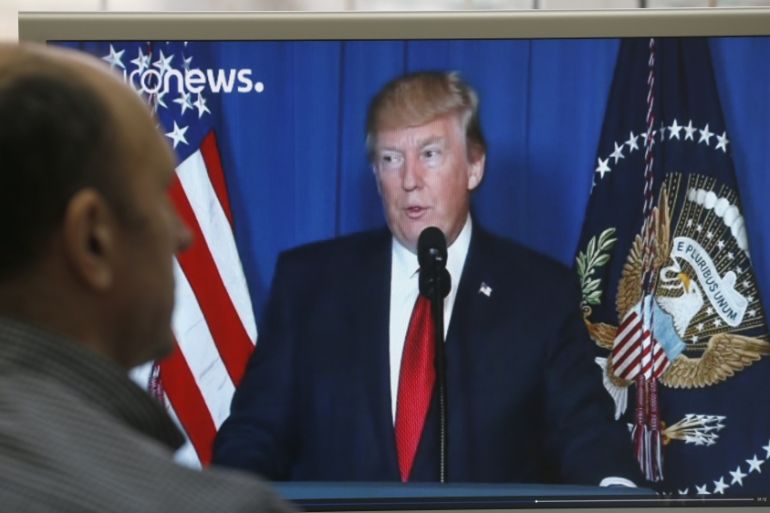Trump is no global humanitarian or friend to Syrians
Analysis: The more obvious reason for Trump’s attack on a Syrian airbase was to silence dissent and whip up patriotism.

The last three weeks have witnessed contradictory moves by the United States vis-a-vis the Syrian conflict.
In late March, US forces attacked civilian areas around Raqqa, including a school and a mosque, killing dozens of civilians. The following week, Nikki Haley, the US Ambassador to the United Nations, flippantly suggested that the US was not interested in removing Syrian President Bashar al-Assad from power.
Yet within a few days of that statement, US forces launched a targeted attack against an airfield used by Russian and Syrian jets to carry out aerial attacks – signalling, for the first time in the conflict, a US willingness to engage directly with regime forces to degrade their capacity.
The suggestion that the US administration, led by President Donald Trump, was suddenly moved to action because of images of dead Syrians, however, is preposterous.
Despite his stated outrage at the Assad regime over a recent suspected chemical weapons attack, Trump’s anti-refugee rhetoric and the banning of Syrians from travelling to the US has not been lost on anyone. Despite the horrors that have been unfolding in Syria for more than six years now, Trump has previously responded with a noticeable lack of empathy and compassion for the victims of the bloody conflict.
Still, this week’s attack appeared to signal the start of a new phase in the Syrian conflict – one in which opposition demands, such as a no-fly zone, humanitarian safe zones and arming of rebel groups, could be back on the table.
|
|
So what does this mean for the future of the Syrian conflict? Are we seeing a radical shift in US policy, towards greater US-led intervention and a possible conflict with the Syrian regime and its allies?
Unlikely. While many members of the Syrian opposition and their supporters will be emboldened by the attack and will renew their calls for greater US intervention, these calls are likely to fall on deaf ears. The US will remain committed to the survival of the regime for many reasons.

Trump is no global humanitarian or friend to the Syrians, who have been suffering for years from conventional and chemical weapon attacks alike. While one should not expect this administration to have learned any lessons from previous US imperial adventures in the region, especially Iraq, the country’s security concerns continue to revolve around the amorphous threat posed by global “terrorism”, including the Islamic State of Iraq and the Levant group (ISIL, also known as ISIS).
In this respect, while the Assad regime is bad, it is still fighting on the right side. The possibility that US officials – no matter how divorced their thinking is from recent history – would conclude that a large-scale intervention in Syria would fit within their “war on terror” is very low.
The interests of this administration seem to lie more in the projection of military strength than in bringing about regime change. Correcting former President Barack Obama’s “red lines” retreat, in which he suggested military intervention would follow any chemical attacks but then failed to act, may also have motivated this week’s airfield strike.
READ MORE: Syria gas attack – ‘We found bodies all over the floor’
The reality is that Trump’s presidency has grown increasingly unpopular, wrought by internal disarray, federal investigations, allegations of corruption and a stunning incompetence in international affairs. As we remember from the Reagan, Clinton, Bush and Obama presidencies, a quick, targeted strike against a hapless target in some far-off land is a great way to consolidate support, silence dissent, whip up patriotism, and rally politicians of all stripes. This, more than any radical shift in US policy, is a more obvious reason as to why the US opted to attack Assad’s regime.
Given the coordination between Russian and US officials around the attack – the former were given ample warning – it is unlikely that the conflict will continue to escalate beyond the boundaries of the current Russian-American understanding. The increased coordination between the two sides evidenced in recent months is likely to persevere.
In the end, the last thing Syria needs is more missiles and bombs raining down. More war never ends war, and Syria is no exception. Today, more than ever, what is needed are serious political negotiations to bring about an end to this tragedy.